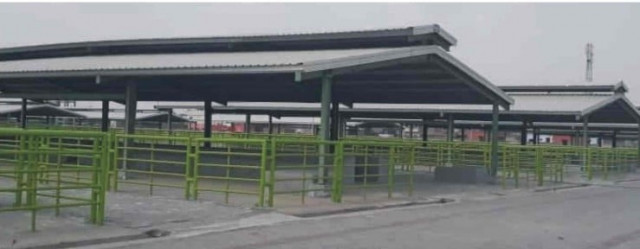Free cattle markets set up to save vendors from contractors
Mobile cattle markets raise questions over district admin's control, city cleanliness

PHOTO: EXPRESS
The prices of sacrificial animals and even the booking fees of butchers have skyrocketed in the city.
Rawalpindi Commissioner Saqib Zafar on Tuesday said that they had set up 16 designated cattle markets across the district.
Fumigation of sacrificial animals stressed
He added that the idea of setting up the markets was to protect animal vendors from the heavy fees they would have to pay market contractors and middlemen and that they could turn a real profit for the hard work they had put in rearing animals the entire year.
Chairing a meeting of the board of directors of the Cattle Market Management Company — responsible for managing cattle markets in the city, Zafar directed to ensure the provision of all facilities at these markets including food outlets, tea stalls as well as vaccination and anti-tick spray for livestock in markets across the district.
He ordered to check every cattle head brought to the market for sick and diseased animals so that the public are only provided with healthy options.
Mobile cattle markets
Despite the district administration’s efforts to confine cattle herders to the designated markets on the outskirts of the district, a large number of shepherds and cattle traders have ventured onto the streets of the city in a bid to make a quick sale.
The livestock department, which is overseeing official cattle markets, checks and certifies whether the animals brought to the markets are well and not diseased. Animal traders have to get their animals checked to secure a health certificate and clearance to do business in the market. However, individual cattle herders with two or three large animals and a few smaller goats and sheep have been freely roaming the streets of the city.
These traders do not carry any health certificates.
A local said that it is easier to buy from these livestock sellers who are roaming the streets of the city since the markets have been set up on the outskirts of the city and require substantial time and energy to travel to.
When asked he said that they were concerned whether the sacrificial animal they were buying was healthy or not, but that they could visually verify that as well by looking at the animal and its condition.
Unlike official markets, mobile-cattle-traders have exonerated themselves from providing any receipt to buyer hence there is no way to tell whether those selling the animals are its original owners or whether the animals have been stolen. Moreover, with the influx of cows, goats and camels on the streets of the garrison city have added to the cleanliness woes with the animals openly defecating in the streets and neighbourhoods.
PES to deploy 9,907 rescuers
Butcher prices rise
As Eidul Azha draws near, most of the professional butchers have been booked. As a result, it has opened the door for many amateur butchers to fill the gap while making a quick buck.
Butchers have set their rates as per the day and the time at which they will have to slaughter the sacrificial animals.
Rates for large sacrificial animals such as cows and bulls have been set between Rs10,000-Rs12,000. For smaller animals such as goats and sheep, the rate is Rs3,500. These rates are applicable on the first day of Eid.
For the second day, the rates for slaughtering large animals is set at Rs8,000 while Rs2,500 has been set for smaller animals.
Similarly, the rates for the third day slightly lower with Rs5,000-Rs6,000 for large animals and Rs2,000 for smaller animals.
Cattle trading gains momentum
With less than a week to go until Eidul Azha, the sale and purchase of sacrificial animals have gained momentum in all 16 cattle markets across the city.
The markets are operating around the clock, despite the rain. However, both buyers and sellers are unhappy over the prices of sacrificial animals.
Citizens are complaining about inflated rates, while farmers and sacrificial animal traders blamed high input costs and transport charges.
Transporters have been milking the business of shifting animals from markets to homes, charging a minimum of a thousand rupees for even the shortest of routes. Transporters said that on an estimate, they are making 10-15 trips a day, earning between Rs20,000-Rs25,000 per day.
Decorating sacrificial animals
Many enthusiasts are trying to decorate their animals with different ornaments such as colourful bead garlands, crowns and bells.
Multicoloured-belts and lighting stripes which could be girthed around an animal’s neck are considered to be a favourite accessory.
Nabeel, a resident who had just bought a sacrificial animal, said that though his bull was naturally quite beautiful, he had also purchased some ornaments to enhance its beauty.
Children are seen sitting alongside their animals the entire night while competitions on the decoration of animals with different colourful items are organised in various parts of the city.
However, some complained that vendors selling decorative items have raised their prices.
Nabeel said that he had paid Rs3,000 for eight ‘payals’ (foot rattlers) and a set of colourful ropes to mount on the bull’s head.
“We only get few days of earning,” explained Bilal, who was operating an animal accessory stall.
He added that he did not want to sell items at high prices to people but they were receiving items at inflated prices from the market, which left them with little choice but to raise their prices.
RWMC cleanliness plan
The Rawalpindi Waste Management Company (RWMC), Rawalpindi and Chaklala Cantonment Boards have started preparations to launch a grand cleanup operation during the three days of Eid to remove offal and other waste.
For this purpose, the holidays of all cleaning staff have been cancelled while all related machinery has been sent to the workshops to get them in running condition.
Sources said that they are setting up joint control rooms for monitoring the operation and to address complaints around the clock.
A committee comprising heads of all three departments has also been formed to oversee field operations.
Citizens have been requested to inform the control room regarding any corpse tossed into roadside or any other space so that timely action could be taken before they start releasing odour and spreading filth.
Published in The Express Tribune, August 7th, 2019.



















COMMENTS
Comments are moderated and generally will be posted if they are on-topic and not abusive.
For more information, please see our Comments FAQ